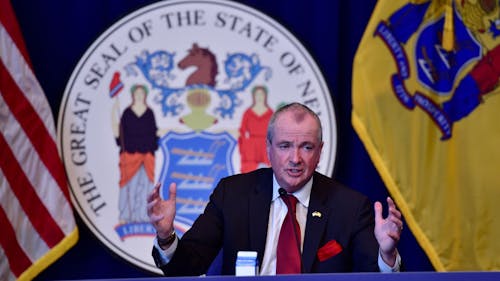Murphy postpones indoor dining as other NJ services continue to reopen

New Jersey continued its economic reopening process this week, with some setbacks, as the number of coronavirus disease (COVID-19) cases reached 172,742 statewide along with 13,308 total deaths, according to the New Jersey Department of Health.
Gov. Phil Murphy (D-N.J.) held a press conference on Monday to announce that the resumption of indoor dining services, which The Daily Targum reported was scheduled to begin July 2, would be postponed until further notice. Murphy said this decision was made due to the rise in COVID-19 cases in states that already began reopening restaurants.
"We do not wish to see New Jersey experience a similar spike," he said. "We have been cautious throughout every step of our restart and have always said we would not hesitate to hit pause if needed to safeguard public health, and this is one of those times."
Another factor in the indoor dining decision, Murphy said, is the lack of compliance with state guidelines at some businesses that have already reopened. He said while the majority of New Jersey businesses are enforcing social distancing and face coverings, officials want to see everyone taking precautions before the reopening process can continue.
Although indoor dining was paused, Murphy said other aspects of reopening are still on track to continue. Outdoor graduation ceremonies with social distancing and face coverings are scheduled to begin July 6.
On Tuesday, Murphy announced the state legislature passed a new budget for the remainder of the extended fiscal year. The budget cut approximately $1.2 billion in previously authorized spending, excludes approximately $850 million in proposed spending and cuts non-salary expenses by approximately 5 percent. Funding for schools, social programs and modernizing the state's unemployment platforms is maintained, he said.
"In the most essential terms, this three-month plan can be described in two words: cuts and uncertainty, and it contains plenty of each," he said.
Murphy said sales tax revenue has begun rising as the state continues with reopening, but said there is no guarantee this trend will continue. The budget includes approximately $950 million in surplus funding to help support the state as it enters the next fiscal year, but Murphy said this amount is still not enough.
The Targum previously reported Murphy asked visitors from states with large COVID-19 outbreaks to self-isolate when arriving in New Jersey. On Tuesday, Murphy updated the list of COVID-19 hot spots, which now includes Alabama, Arkansas, Arizona, California, Florida, Georgia, Iowa, Idaho, Louisiana, Mississippi, North Carolina, Nevada, South Carolina, Tennessee, Texas and Utah. He also advised visitors to get tested for COVID-19 while visiting to help prevent the spread of the virus.
At his press conference on Wednesday, Murphy presented data from Johns Hopkins University which shows that New Jersey is 1 of only 2 states in the country to show weekly decreases in the number of COVID-19 cases. He said if residents want to continue this progress, they must adhere to state guidelines, such as social distancing and wearing face coverings.
"Don't be the match that starts the (COVID-19) wildfire," he said. "Use your common sense for the common good."
Yesterday, a variety of New Jersey businesses reopened, including casinos, outdoor amusement parks, outdoor water parks, museums, libraries, playgrounds, indoor recreation facilities such as bowling alleys, batting cages, shooting ranges and arcades as well as gyms and fitness centers for individualized training by appointment only. Murphy said individuals who plan on visiting these businesses or going out for the holiday weekend must social distance and wear a mask when visiting an indoor business.
Murphy also signed two executive orders yesterday, the first raising the number of people who can attend an outdoor gathering from 250 people to 500, effective today, and the second extending the public health emergency for another 30 days. He said this action means officials have the authority to respond to any new COVID-19 outbreak.
One way the state is preparing for new outbreaks, he said, is through the Rutgers School of Public Health's Community Contact Tracing Corps. He said the number of contact tracers has risen to 357 people, and the corps is working to continue onboarding more tracers. The School of Public Health also invited 859 local public health officials to be trained on the reporting system, with approximately 600 completing training.
He said contact tracing, combined with testing and isolation programs, will help officials respond to future COVID-19 cases.
"The expectation is we can spot (a new outbreak), surround it, isolate it and drive it back into the ground," he said. "Those are assets we literally did not have at our disposal … when this crisis started."



